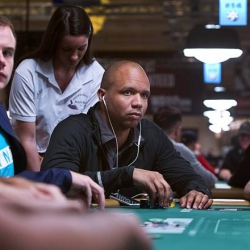
Phil Ivey and Cheng Yin Sun have been accused of edge sorting in Atlantic City, London, and Singapore.
US District Court Judge Noel Hillman ruled on Friday that Phil Ivey and Cheng Yin Sun violated state law when they won $9.6 million from the Borgata casino in Atlantic City in 2012. Judge Hillman ruled that the pair violated New Jersey gambling regulations on four separate occasions during 2012.
Phil Ivey, one of the world’s most famous poker players, played at the Borgata’s baccarat tables on four separate occasions from May to August 2012.
Each time, he and his companion, Cheng Yin Sun, asked for special VIP treatment, which Borgata was happy to supply.
Phil Ivey’s VIP Treatment
The VIP treatment included purple Gemaco playing cards, a Chinese language translator, and the ability to sort the cards as they saw fit. The two would ask the baccarat dealer to sort cards in a pattern, so Ivey and his companion knew the approximate order cards would come.
What Borgata’s staff did not know at the time was the purple Gemaco cards were faulty, so that the backside of certain numbered cards looked different than other cards. It would take a highly-perceptive set of eyes to notice the differences while cards were being sorted, but Cheng Yin Sun had such a set of eyes.
During the early sessions in 2012, Borgata and Ivey agreed to play for $50,000 a hand. After Ivey won several million dollars playing for $50,000 a hand, Borgata lured the high roller back with promises of $100,000-a-hand baccarat. Ivey accepted, then won several more millions-of-dollars from Borgata.
Noel Hillman’s Legal Opinion
Judge Hillman ruled, in doing so, the pair violated the New Jersey Casino Control Act, which stipulates that New Jersey regulations must be upheld for a game to be legal.
Hillman wrote in his opinion, “Borgata and Ivey had the same goal when they entered into their arrangement: to profit at the other’s expense. Trust is a misplaced sentiment in this context.”
Crockford’s Casino Case
In May 2013, Phil Ivey sued the London casino, Crockford’s Casino, for refusing to pay him £7.8 million he won playing Punto Banco (baccarat) in August 2012. The case became a national sensation in the United Kingdom. Crockford’s claimed Phil Ivey used edge-sorting to gain an unfair advantage in the 2012 baccarat sessions. A London magistrate ruled on behalf of Crockford’s and Ivey appealed. He lost that appeal on April 14, 2016.
The decision to sue Crockford’s may have been a strategic blunder by Phil Ivey, who has won 9 World Series of Poker bracelets as one of the world’s best card players. When he sued the London casino, it tipped-off Borgata that Phil Ivey might have been edge-sorting in his 2012 baccarat sessions at Borgata. Atlantic City’s most successful casino sued to retrieve their $9.6 million lost to Ivey.
Borgata’s Lawsuit
Judge Hillman ruled that Phil Ivey and Cheng Yin Sun did not break the rules of baccarat. Instead, he ruled that they broke the regulations of New Jersey when they used edge-sorting techniques to gain an advantage.
In Noel Hillman’s opinion, he wrote that he viewed “their actions to be akin to cunning, but not rule-breaking, maneuvers performed in many games, such as a play-action pass in American football, or the ‘Marshall swindle’ in chess.”
Remarkable Mental Acumen
The federal judge also described Sun’s “mental acumen” at spotting the imperfections on the Gemaco cards as “remarkable.” Despite those two assertions, Hillman said Ivey and Sun were in the wrong.
Hillman wrote, “Even though Ivey and Sun’s cunning and skill did not break the rules of Baccarat, what sets Ivey and Sun’s actions apart from deceitful maneuvers in other games is that those maneuvers broke the rules of gambling as defined in this state.“
